AI is transforming business operations, especially when it comes to customer service and automation. As small and midsize businesses look to boost efficiency and embrace innovation, one of the most common questions they ask is, “What’s the difference between an AI agent and a chatbot?”
The two terms are often used interchangeably, but they’re not the same. While both can be valuable, understanding their differences helps you make informed decisions for your business.
Whether you’re looking to automate customer inquiries, qualify leads, schedule appointments, or support internal workflows, chatbot AI and AI agents each offer unique strengths. Choosing the right one can determine how well your AI strategy scales with your business.
In this guide, I’ll break down the difference between chatbots and AI agents, compare their capabilities, and help you choose the best tool for your needs. Whether you’re new to AI or simply looking to upgrade, I’ll show you how to align your technology with your goals.
What is a chatbot?
A chatbot is a computer program that simulates real human conversation through text. They are typically built to handle specific, predefined tasks, especially answering frequently asked questions.
There are also different types of chatbots. Older chatbots were often rule-based, stuck following predefined scripts and decision trees. Today’s AI chatbots are more flexible, using natural language processing (NLP) to understand input and respond more intelligently.
Capabilities of a chatbot
Chatbots excel at various tasks, including
- Providing basic customer support
- Handling frequently asked questions
- Managing simple, straightforward workflows
They can also guide users through common processes like checking an order status, providing store hours, or navigating to a specific webpage.
Strengths of chatbots
The main advantages of chatbots include
- 24-7 availability
- Reduced wait times
- Quick deployment/instant responses
They can efficiently handle common queries, making them a great fit for online customer service and ensuring customers always have a point of contact.
Limitations of chatbots
Even with recent advancements, chatbots may struggle with
- Managing complex, multi-turn, evolving conversations
- Learning from past interactions to personalize future ones
When requests are unexpected or nuanced, they may escalate to a human agent.
What is an AI agent?
An AI agent, also known as a virtual agent, is a more advanced and autonomous class of AI system. Unlike simple chatbots, AI agents use large language models (LLMs), machine learning (ML), and real-time data to understand their environment, make decisions, and handle complex tasks without constant human direction.
They’re designed to take action, not just respond. They can manage multi-turn conversations, pull information from various databases, learn from previous interactions, and adapt over time to deliver personalized service.
Capabilities of an AI agent
When the needs of your business surpass the capabilities of a traditional chatbot, it’s time to consider an AI agent. In short, AI agents are built to
- Retrieve and process real-time data.
- Understand context and respond to nuanced questions.
- Integrate with other business tools such as calendars and customer relationship management systems.
- Learn and adapt over time to deliver more personalized interactions.
- Handle evolving, multi-step workflows (like booking appointments or processing returns).
AI Agents can also automate sophisticated workflows, coordinate tasks across multiple applications, and even handle advanced decision-making. For example, an AI agent can answer a customer’s question about a product and also check inventory, process an order, schedule a delivery, and send a confirmation email, all within a single interaction.
Strengths of AI agents
Modern AI agents are flexible and adaptable in many ways. They’re powerful tools for
- Scaling with business growth
- Offering intelligent, context-aware conversations
- Automating complex decision-making
- Delivering personalized, human-like interactions
Limitations of AI agents
When adding AI agents to your business processes, keep these key considerations in mind:
- Higher initial investment
- Additional setup and integration required
- Ongoing training and maintenance needed
Key differences between AI and chatbots
While the two definitions can overlap, true AI agents go far beyond basic conversational automation. Here’s a quick comparison to help you visualize the key differences between an AI agent and a chatbot:
| Feature | AI agent | Chatbot |
|---|---|---|
| Technology base | Uses LLMs, real-time data, and ML | Rule-based or NLP with limited learning capacity |
| Conversation style | Multi-turn, adaptive, context-aware | Scripted or limited context retention |
| Task complexity | Can manage complex workflows and decision-making | Limited to simple questions and tasks |
| Personalization | Learns from past interactions and user history | Minimal personalization |
| Scalability | Designed for dynamic, evolving business environments | Suitable for static, predictable tasks |
Why AI chatbots are still valuable
AI agents are powerful, but that doesn’t mean chatbots no longer have a place in business.
Chatbots remain a critical tool for many businesses in search of fast, cost-effective customer support solutions. They excel at providing 24-7 instant responses to common, straightforward questions, reducing customer wait times and improving overall customer satisfaction. They’re also generally easier and quicker to implement and maintain.
If your business needs a quick, affordable, and easy way to answer repetitive questions or support basic workflows, chatbots are a smart investment. Plus, for companies new to AI automation, starting with a well-designed chatbot can be a great entry point without the initial complexity of a full AI agent deployment. As your needs evolve, you can always upgrade to a more robust AI agent system.
Which should you choose?
Choosing between a chatbot and an AI agent comes down to your business goals and needs. Consider your business’s complexity, the type and volume of the interactions you expect, and your desired level of automation.
Still on the fence? Here are a few questions to ask yourself:
- Do you want a tool that grows with your business?
- Do you need simple, fast automation or intelligent workflows?
- How much are you willing to invest in setup and maintenance?
- Are your customers asking repetitive questions, or are they looking for personalized, evolving support?
For simple customer service needs and instant handling of a high volume of repetitive questions, look into chatbot pricing. Chatbots can quickly answer FAQs, provide basic information, and take pressure off human support teams.
But for scalable, intelligent automation of complex workflows, highly personalized interactions, deep integration, adaptability, and proactive problem-solving, AI agents are the superior choice. Hybrid chatbots are yet another option that could fit into your strategy.
How Jotform AI Agents combine the best of both worlds
Jotform AI Agents are designed to bridge the gap between simple chatbots and fully fledged AI agents, offering sophistication with user-friendly accessibility. This is a perfect blend for teams curious about AI adoption.
Jotform AI Agents
- Deliver personalized, context-aware conversations.
- Feature robust natural language understanding and continuous learning capabilities.
- Automate complex tasks like appointment scheduling, lead qualification, and form filling.
- Provide multichannel support (chat, phone, WhatsApp, SMS) with seamless integration into existing workflows.
Best of all, their easy no-code setup and customization make them accessible for businesses of all sizes, so you can roll out powerful AI solutions without extensive technical expertise.
With Jotform AI Agents, businesses can significantly reduce manual workload, improve data accuracy, and enhance customer satisfaction compared to standard chatbots.
Transform your business with intelligent automation
Both AI chatbots and AI agents play important roles in modern business automation. While chatbots offer quick, efficient solutions for common queries, sophisticated AI agents provide intelligent, proactive automation that learns and adapts.
Modern businesses need flexibility. That’s why Jotform AI Agents are built to grow with you, offering scalable, intelligent automation with a user-friendly interface.
Ready to find the right AI-powered assistant for your unique business needs? Explore Jotform AI Agents and discover how they can transform your customer service, scheduling, and lead qualification processes. You can also compare features with other leading tools to find the best AI assistant for your needs.
AI agent vs chatbot FAQ
While many modern chatbots use AI technologies, not all chatbots are “true” AI agents with advanced decision-making and learning capabilities.
Generally, yes. They both refer to autonomous AI-powered systems that can handle tasks and conversations without constant human direction.
This article is for marketing agencies, content managers, website operators, and anyone who wants to understand the differences between AI agents and chatbots to choose the right conversational AI technology for business automation and customer engagement.




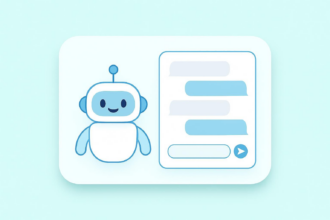


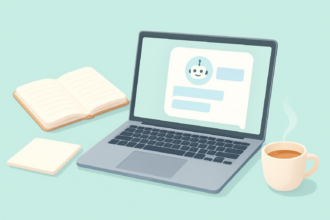





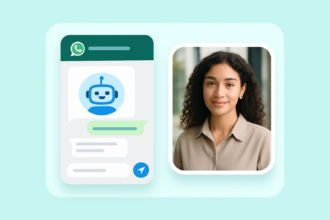
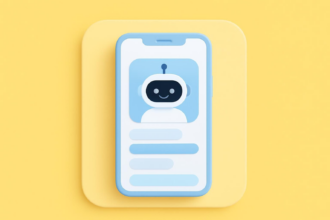
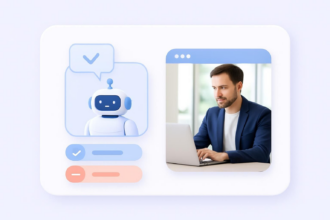
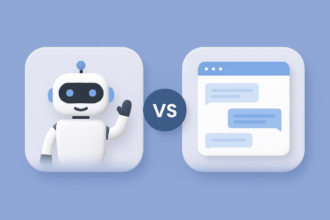
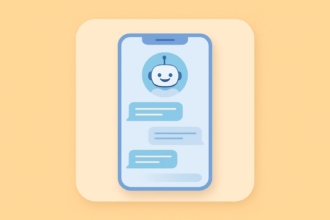
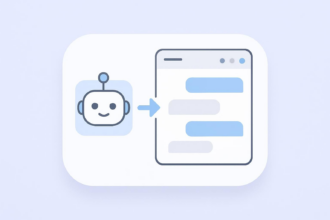
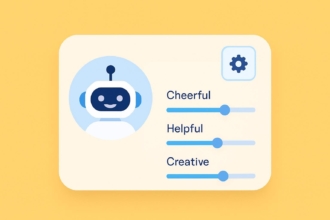



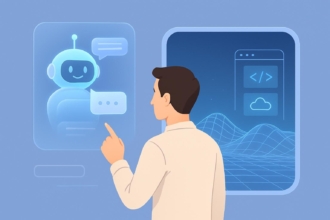

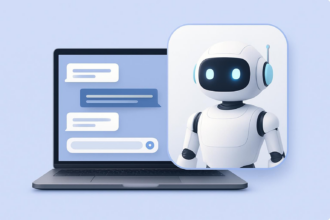




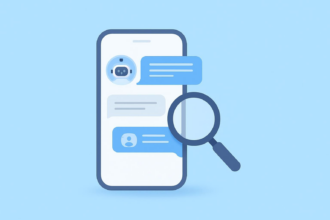
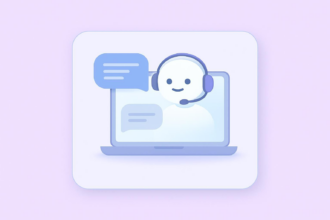

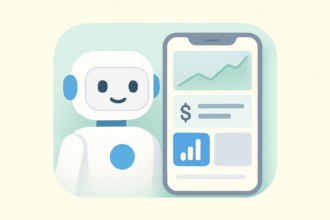
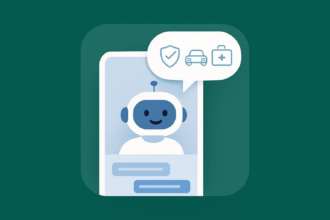
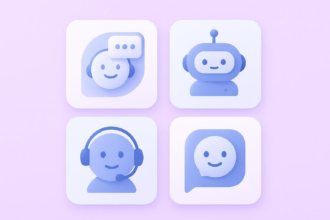
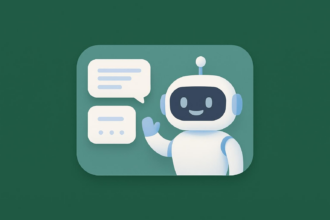






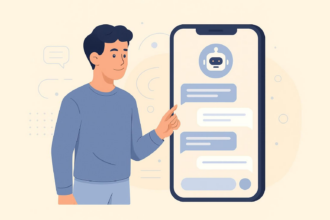

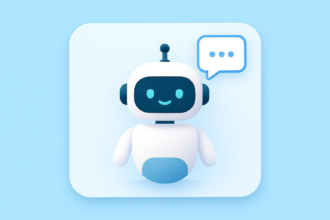
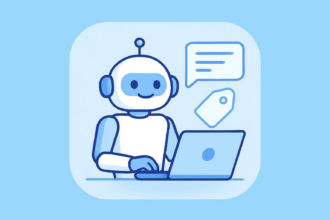
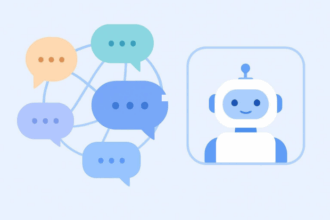


Send Comment: